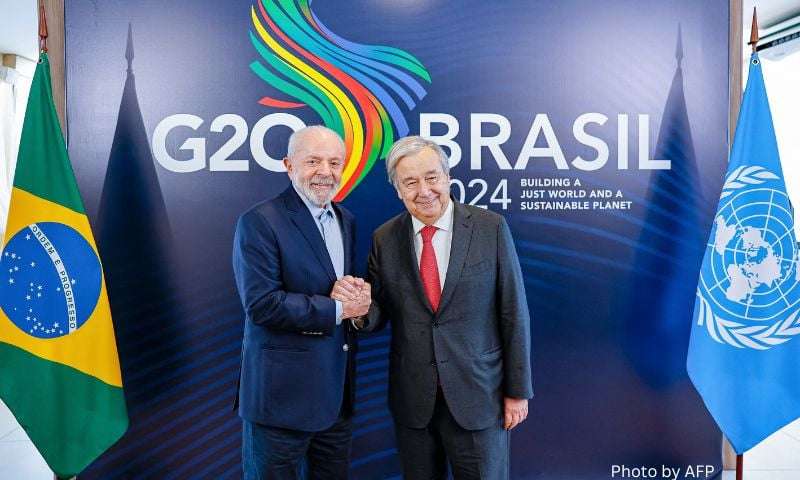
|
Getting your Trinity Audio player ready...
|
Geopolitics Overshadowing Economic Challenges
KARACHI:
As Brazil prepares to host the G20 summit on November 18 and 19, questions arise about the grouping’s ability to tackle pressing economic and climate challenges. Originally conceived in response to economic crises, the G20 has increasingly been swayed by geopolitical agendas, affecting its credibility and effectiveness.
The G20’s Original Purpose
The G20 was created to serve as a bridge between advanced economies in the West, like those in the G7, and the leading emerging economies of the Global South. Its primary goal was to address global economic issues and foster cooperation among the world’s major economies. However, recent summits have seen a shift in focus towards geopolitics, largely influenced by the US foreign policy agenda.
Geopolitics Taking Center Stage
At the last G20 summit in India, US President Joe Biden and Indian Prime Minister Narendra Modi unveiled the India-Middle East-Europe Economic Corridor (IMEC) to counter China’s Belt and Road Initiative (BRI). This move exemplified how geopolitical rivalries have overshadowed the G20’s economic mission. Under the Biden administration, the G20 has been drawn into the New Cold War narrative, focusing more on geopolitical conflicts than on geoeconomic cooperation.
The Need for Geoeconomic Focus
For the G20 to regain its credibility, it must disentangle itself from the geopolitical agendas of its members, particularly the United States. The focus should return to geoeconomics, fostering global economic cooperation, combating protectionism, and promoting free trade. The grouping should also prioritize addressing climate change, advancing artificial intelligence (AI) development, ensuring cybersecurity, and enhancing regional economic connectivity.
G20’s Global Influence
The G20 represents about 60% of the global population, 80% of the world’s GDP, and 75% of global exports. Brazil’s presidency of the G20 is emphasizing global governance reform, social inclusion, and energy transition. The summit in Rio de Janeiro marks the conclusion of a year-long effort by Brazil to steer the group’s agenda, and it will be a pivotal moment as the country hands over the presidency to South Africa.
Challenges Facing the G20
Climate Change and Energy
One of the critical challenges the G20 faces is climate change. Despite representing a significant portion of global emissions, the group has struggled to agree on effective measures to phase out fossil fuels. The commitment to merely “phase down” coal highlights the difficulties in reaching a consensus on urgent climate action.
Economic Disparities
Economic disparities between the North and the South remain a significant issue. The G20 has the potential to bridge this gap by addressing poverty, enhancing climate financing, and fostering sustainable development. However, separating geopolitics from geoeconomics is a complex task, as the two are often intertwined.
Governance and Reform
Effective global governance requires cooperation among member states, which is often hindered by geopolitical tensions. For the G20 to achieve its goals, it must promote inclusive and equitable policies, support the development of emerging economies, and ensure that global economic growth benefits all.
Pakistan’s Role and Challenges
Peripheral Influence
Pakistan, despite being a member of numerous economic forums and regional groupings, has played a peripheral role in the G20. This is due to several factors, including political instability, economic challenges, and insufficient investment in key areas such as education, technology, and healthcare.
Economic Reforms
To leverage its position in global forums like the G20, Pakistan needs to undertake significant economic reforms. This includes addressing the widening gap between revenues and expenditures, reducing reliance on external borrowing, and fostering a stable political environment conducive to economic growth.
Investment in Human Capital
Investing in human capital is crucial for Pakistan’s economic development. This involves improving education, healthcare, and technological capabilities, and ensuring a robust constitutional order that supports independent and efficient institutions.
SEE ALSO:
https://skipper.pk/2024/11/18/smogs-economic-toll-why-action-remains-elusive/
Conclusion: The Path Forward for the G20
The G20 must realign its focus towards its original mission of addressing global economic challenges and fostering cooperation. By prioritizing geoeconomics over geopolitics, the group can enhance its credibility and effectiveness. Successful global models, such as the Belt and Road Initiative, demonstrate the potential for transformative economic cooperation. The G20 should draw lessons from these examples to promote sustainable development, combat climate change, and ensure inclusive growth.
FAQs
1. What is the primary purpose of the G20? The G20 aims to address global economic issues and foster cooperation among the world’s major economies, serving as a bridge between advanced and emerging economies.
2. How has geopolitics affected the G20’s mission? Geopolitical agendas, particularly those influenced by the US, have overshadowed the G20’s focus on geoeconomics, weakening its credibility and effectiveness in addressing global economic challenges.
3. What are the key challenges facing the G20? The G20 faces challenges such as climate change, economic disparities, and governance reform. Reaching a consensus on effective measures and promoting inclusive policies are significant hurdles.
4. How can Pakistan enhance its role in the G20? Pakistan can enhance its role by undertaking significant economic reforms, investing in human capital, and fostering a stable political environment conducive to economic growth.
5. What lessons can the G20 learn from successful global models? The G20 can learn from models like the Belt and Road Initiative, which demonstrate the potential for transformative economic cooperation. By prioritizing geoeconomics, the G20 can promote sustainable development and inclusive growth.






